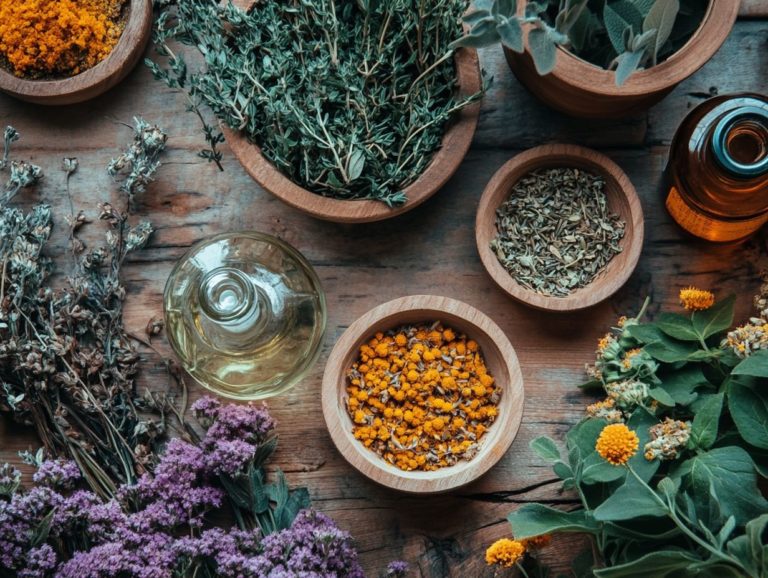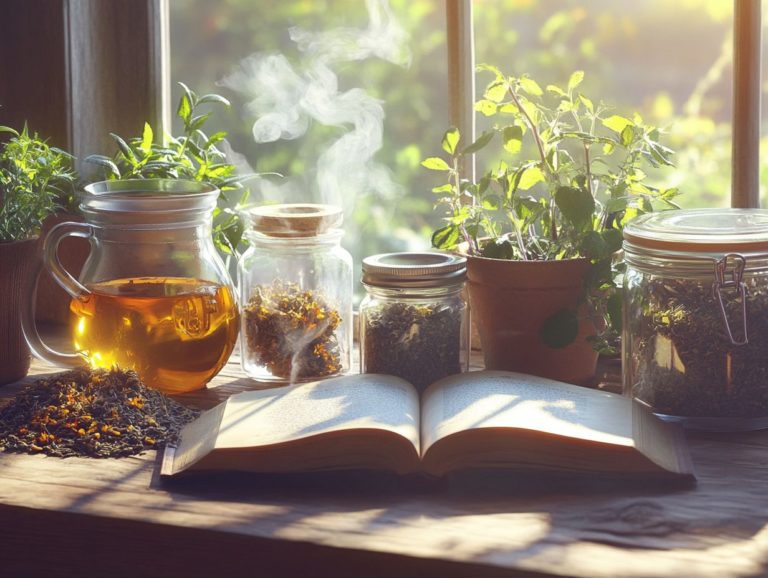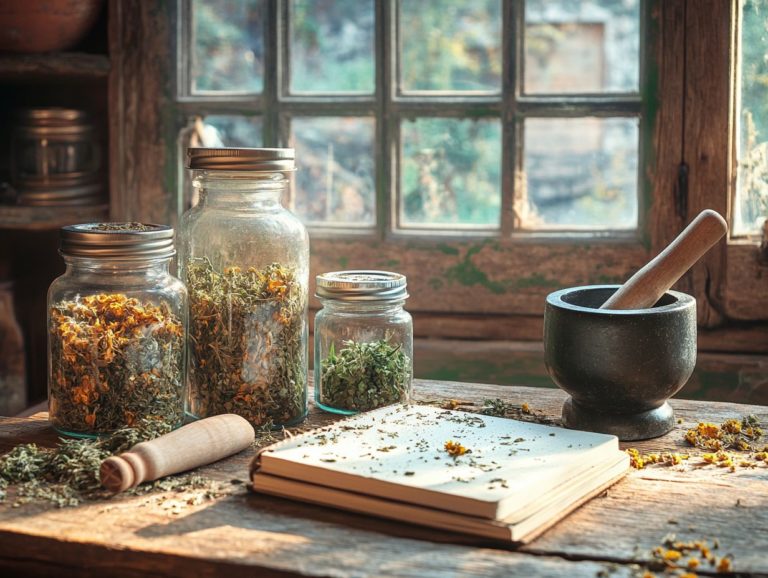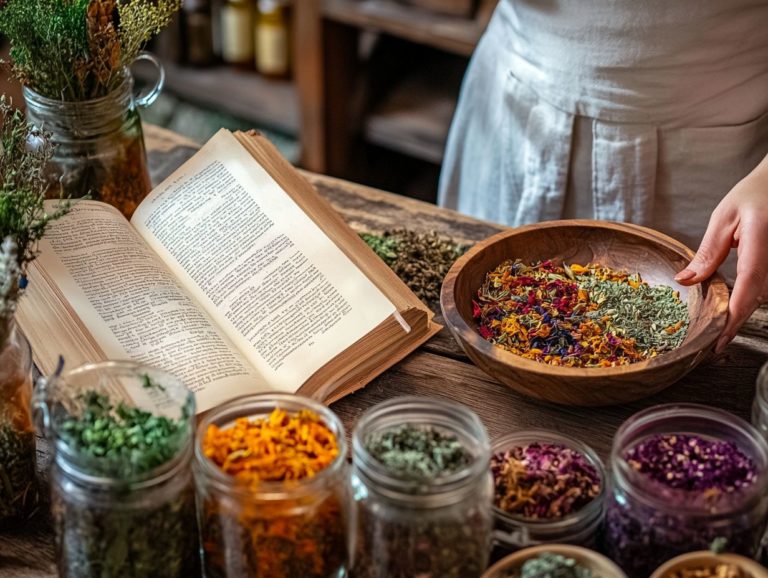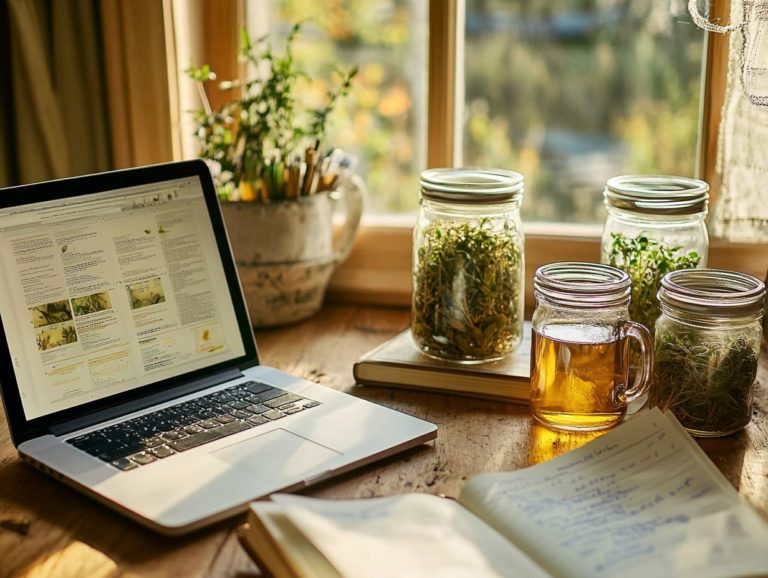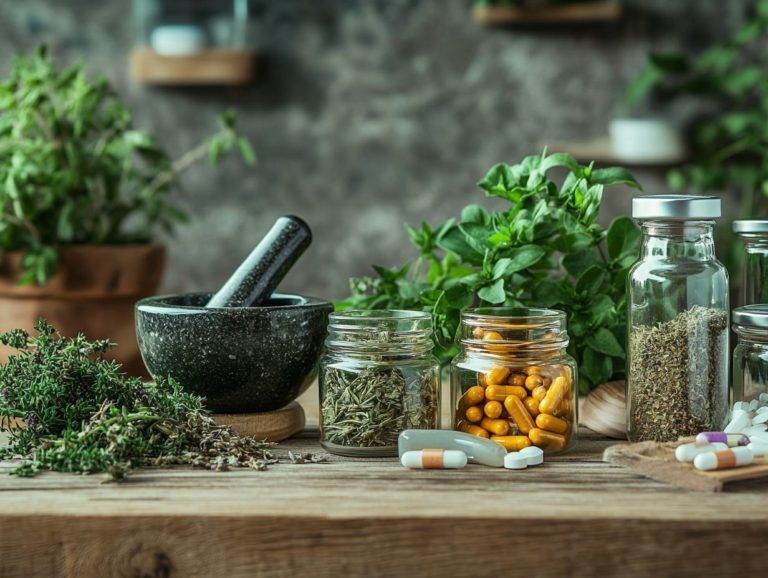What Should I Include in a Herbal Remedy First Aid Kit?
When it comes to first aid, you may find yourself increasingly drawn to nature s healing solutions.
A Herbal Remedy First Aid Kit can be an exceptional addition to your home or travel essentials, seamlessly blending traditional wisdom with modern needs. This article delves into the essential items you should include, explores the uses and benefits of herbal remedies for common ailments, and offers a step-by-step guide to creating and maintaining your kit.
Important safety considerations ensure that your herbal journey is both effective and safe. Get ready to unlock the empowering secrets of natural remedies!
Contents
- Key Takeaways:
- What is a Herbal Remedy First Aid Kit?
- Essential Items for a Herbal Remedy First Aid Kit
- Uses and Benefits of Herbal Remedies in First Aid
- How to Create and Maintain a Herbal Remedy First Aid Kit
- Safety Considerations when Using Herbal Remedies
- Frequently Asked Questions
- What Should I Include in a Herbal Remedy First Aid Kit?
- Why Should I Consider Using a Herbal Remedy First Aid Kit?
- What Are Some Essential Herbs to Include in a Herbal Remedy First Aid Kit?
- Can I Use Essential Oils in a Herbal Remedy First Aid Kit?
- Are There Any Safety Precautions I Should Take When Using a Herbal Remedy First Aid Kit?
- Can I Make My Own Herbal Remedies for My First Aid Kit?
Key Takeaways:
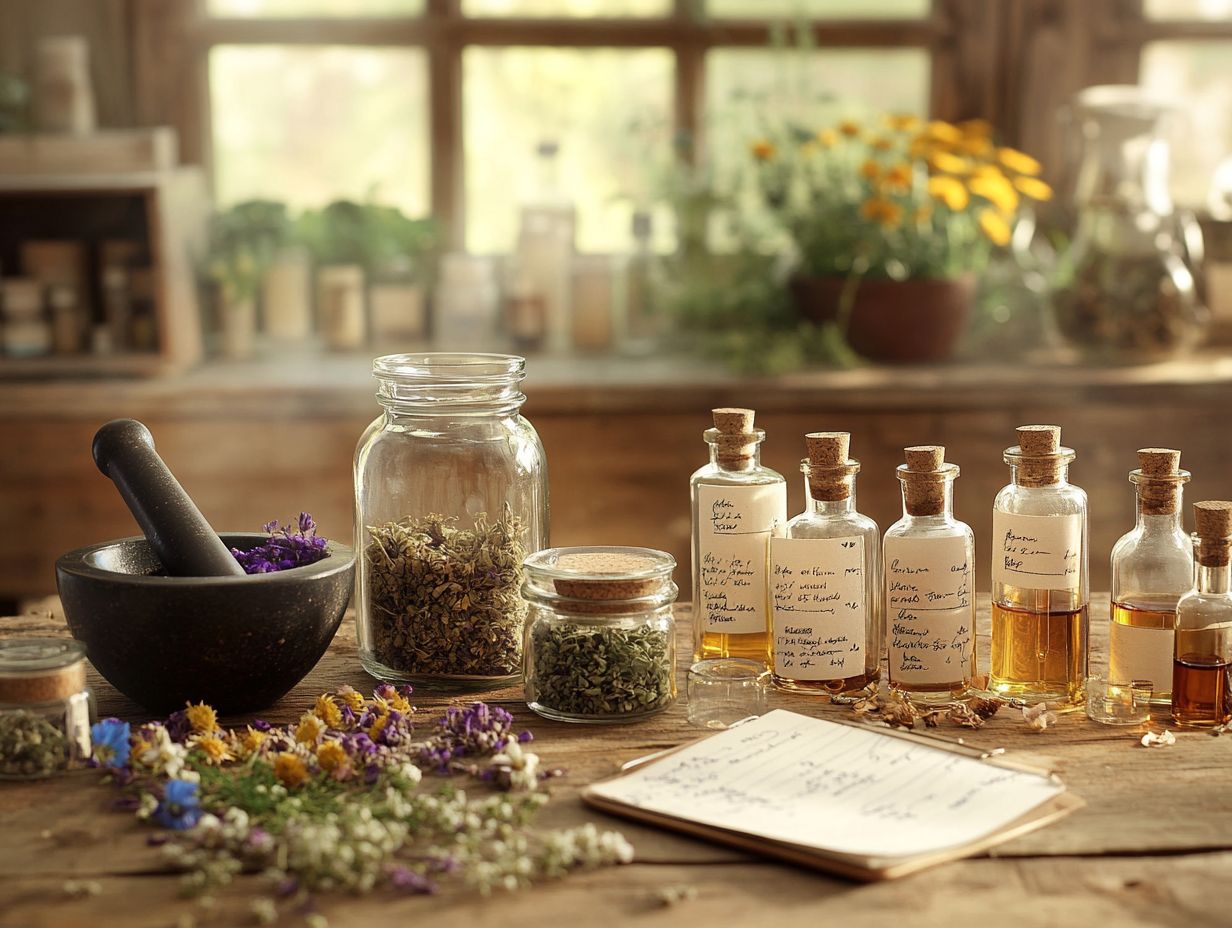
- Include must-have herbs and supplies in your first aid kit, such as aloe vera, lavender, and tea tree oil, for their healing and anti-inflammatory properties.
- Herbal remedies can be effective in treating common ailments like cuts, burns, and insect bites. Research and consult with a healthcare professional for proper usage and dosage.
- When creating and maintaining a herbal remedy first aid kit, follow a step-by-step guide and consider safety precautions, including possible interactions and side effects, to ensure proper and safe usage.
What is a Herbal Remedy First Aid Kit?
A Herbal Remedy First Aid Kit is a critical collection of natural solutions crafted to effectively and holistically address minor ailments and health concerns. This kit usually features an array of healing plants, herbal extracts, and essential oils renowned for their soothing properties, offering a dependable resource for immediate care during emergencies.
By blending traditional herbalist wisdom with contemporary insights from medical herbalists, these kits are thoughtfully designed to cater to the wellness needs of individuals and families, especially within the context of the British Isles, where folk medicine boasts a vibrant legacy.
Essential Items for a Herbal Remedy First Aid Kit
To create an effective Herbal Remedy First Aid Kit, you need to thoughtfully select essential items and medicinal herbs that provide a broad spectrum of therapeutic benefits for the everyday health issues you might encounter.
Consider including soothing herbs like pot marigold and lavender, renowned for their antiseptic properties, alongside Aloe Vera, famous for its remarkable skin healing abilities.
Furthermore, incorporating herbal extracts and infusions will elevate your kit, ensuring a comprehensive approach to health and well-being.
Must-Have Herbs and Supplies
Must-have herbs and supplies for your Herbal Remedy First Aid Kit include pot marigold, Aloe Vera, common thyme, lavender, and rosemary. Each of these herbs is celebrated for its unique health benefits and applications in natural remedies. They not only offer pain relief and bolster your immune system but also play crucial roles in soothing skin and reducing inflammation.
By harnessing their essential oils and extracts, you can significantly enhance the overall efficacy of your herbal first aid approach, making them critical components of your home apothecary.
To fully unlock the potential of these herbal allies, consider crafting herbal tinctures using alcohol or vinegar as a base. This technique helps extract the active ingredients from the herbs, maximizing their benefits.
For soothing wounds and promoting healing, pot marigold shines with its anti-inflammatory properties, easily prepared as a salve or infused in oil. Aloe Vera, famous for its miraculous gel, is excellent for cooling sunburns or minor skin irritations. To ensure safe and effective use of these remedies, it’s important to follow the best practices for herbal remedy use. Meanwhile, common thyme, rich in thymol, works wonders as an antiseptic.
Lavender can be used in calming herbal teas or infused oils, making it your go-to for relaxation and enhancing sleep quality. Rosemary s stimulating compounds not only elevate your culinary creations but can also improve circulation when used in infused baths.
Exploring these methods will completely transform your approach to natural healing, putting the power of herbs right at your fingertips.
Start your herbal journey today. Build your kit and embrace the power of nature s remedies!
Uses and Benefits of Herbal Remedies in First Aid
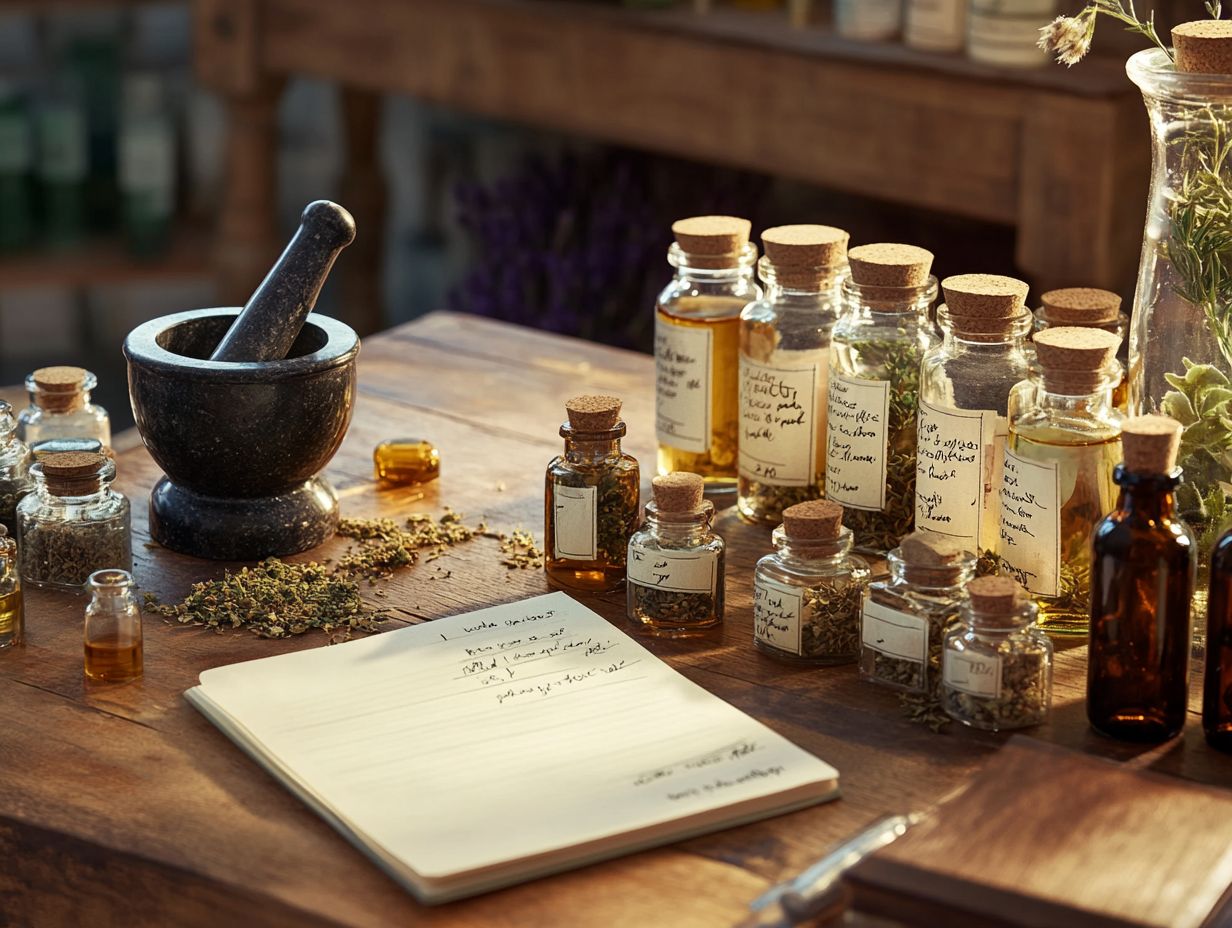
Herbal remedies offer a remarkable array of uses and benefits in first aid. They are critical health solutions for tackling minor ailments and promoting natural well-being.
As interest in holistic approaches grows, herbalists and medical herbalists highlight the effectiveness of these remedies. They can alleviate pain, bolster the immune system, and mitigate inflammation.
By using herbal medicines like liquid extracts made from herbs and infusions, you can harness the healing powers of medicinal plants, fostering a deeper connection with nature-based care.
Common Ailments and Corresponding Herbal Remedies
Common ailments such as minor cuts, bruises, anxiety, and skin irritations can be effectively treated with herbal remedies. These remedies harness nature s power for pain relief, anxiety alleviation, and skin healing.
For example, pot marigold is frequently used for wound care, while lavender is known for its calming effects. Aloe Vera serves as a natural treatment for various skin conditions, offering soothing properties that enhance healing. If you’re interested in learning how to create your own herbal remedy, these plants are a great place to start.
Other common ailments also benefit from herbal remedies. Chamomile tea, for example, is celebrated for its gentle sedative properties. It can help alleviate mild anxiety while promoting restful sleep. Preparing it is easy: just steep a tablespoon of dried chamomile flowers in hot water for about ten minutes. For more comprehensive care, consider incorporating DIY herbal remedies for first aid kits into your wellness routine.
Ginger is a powerful remedy for digestive issues. You can make a tincture or simply add fresh slices to boiling water for a soothing herbal infusion. If you’re curious about cultivating your own plants, you might wonder, can I grow my own herbs for remedies? Each of these remedies uses specific active ingredients that contribute to their beneficial effects, providing accessible and natural options for relief.
How to Create and Maintain a Herbal Remedy First Aid Kit
Start your Herbal Remedy First Aid Kit today for a healthier tomorrow! It requires a thoughtful selection of medicinal herbs and a commitment to regular updates. This ensures you are well-equipped for various health situations.
Begin by identifying the essential herbs and supplies that cater to your needs. Pay attention to their properties for addressing common ailments. Routinely replenish your supplies and expand your knowledge of new herbal preparations to enhance the effectiveness of your kit.
Step-by-Step Guide
A step-by-step guide for assembling your Herbal Remedy First Aid Kit allows you to prepare for minor health issues with confidence and expertise.
As you explore the fascinating world of herbal medicine, you re not just identifying plants; you’re gaining a deeper understanding of their properties and applications. Once you’ve pinpointed key herbs, prepare them with intention.
For instance, creating tinctures from alcohol-extracted herbs allows you to concentrate their beneficial properties effectively. Infusions offer gentle remedies, ideal for teas or compresses.
Knowing how to store your herbal remedies is crucial. Proper storage in dark glass containers, away from light and heat, preserves their potency. To enhance your understanding, you can explore what are the most common herbal remedies and regularly review your kit to ensure its freshness and efficacy, turning it into a trusted resource for unexpected moments.
Safety Considerations when Using Herbal Remedies
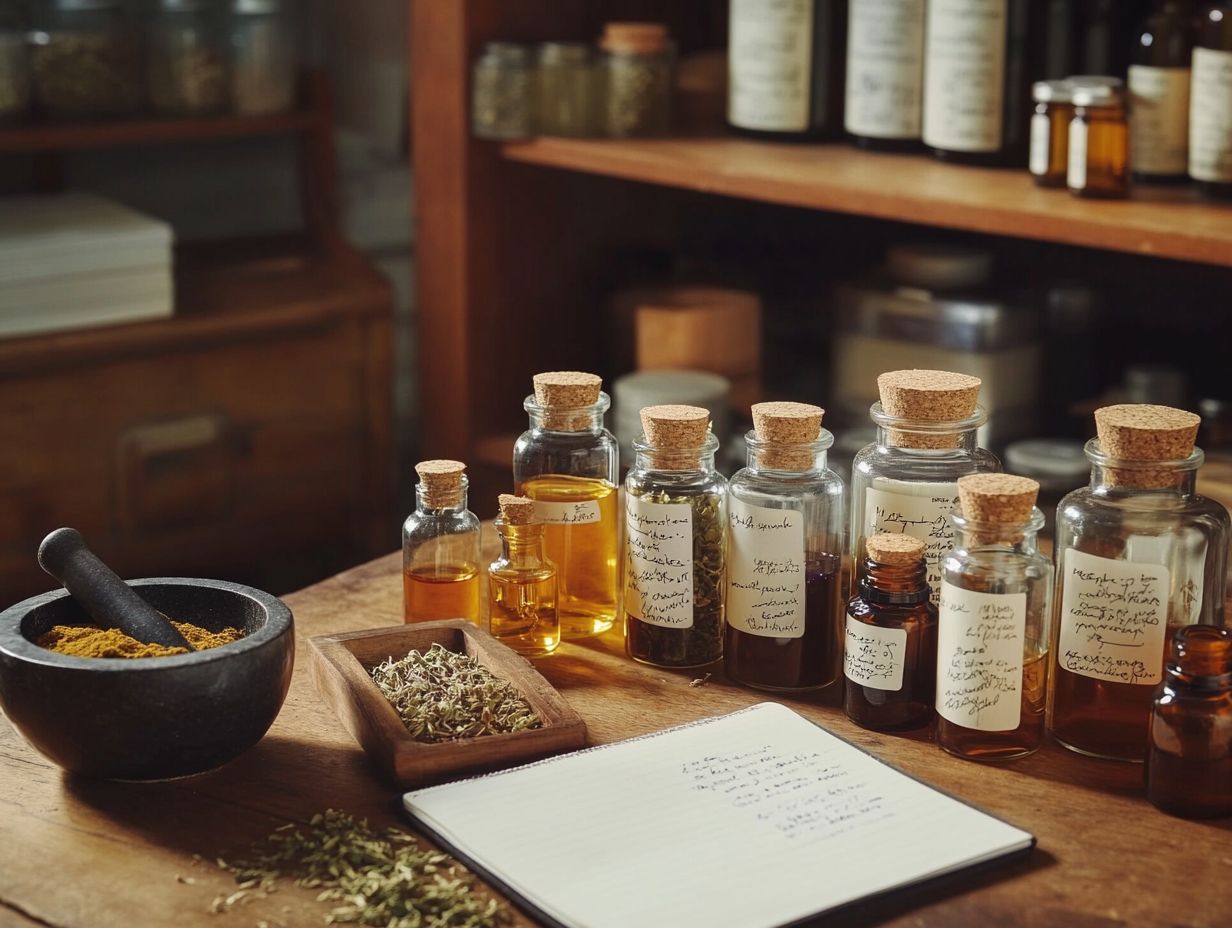
Safety considerations when using herbal remedies are essential for effective and responsible usage, especially when addressing health issues with natural solutions. It’s crucial to understand potential interactions and side effects, as certain herbs may interact with conventional medications or pose risks if not used correctly.
Consulting a knowledgeable herbalist can provide invaluable insights and guidance, helping you navigate safe practices with confidence.
Begin your herbal journey now!
Possible Interactions and Side Effects
Careful assessment of possible interactions and side effects of herbal remedies is crucial since these can vary significantly from person to person and may impact health outcomes. For instance, mixing certain herbal teas with prescription medications could either diminish their effectiveness or escalate toxicity levels. Consulting with knowledgeable herbalists or medical herbalists can be invaluable in navigating these potential hurdles.
Take St. John s Wort as an example; it s known to reduce the effectiveness of antidepressants, while echinacea might interfere with medications that lower your immune system’s activity. Essential oils, often regarded as safe, can also lead to allergic reactions or skin irritations in some individuals, underscoring the importance of a comprehensive understanding before use.
This is where holistic solutions shine. They consider the whole person and provide guidance on potential interactions and side effects tailored to your unique health profile. Therefore, conducting thorough research, including understanding what to include in herbal remedy research, and seeking professional consultation with experienced herbalists is essential to ensure that these natural treatments enhance your wellness journey rather than complicate it.
Frequently Asked Questions
What Should I Include in a Herbal Remedy First Aid Kit?
A herbal first aid kit for treating minor ailments should include a variety of herbs and essential oils like rosemary and eucalyptus that can be used to treat common ailments and injuries.
Why Should I Consider Using a Herbal Remedy First Aid Kit?
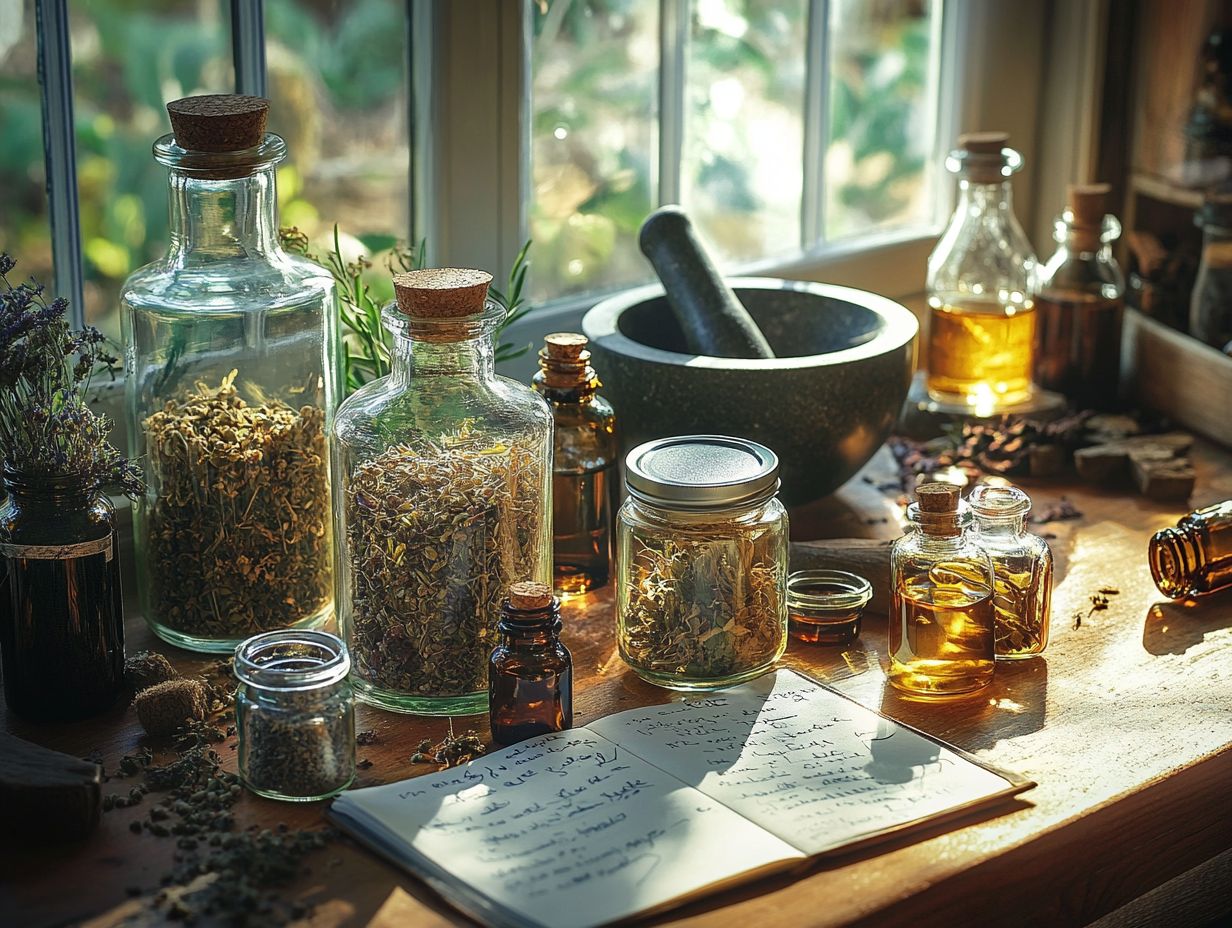
Herbal remedies can be just as effective, if not more so, than traditional first aid supplies. They also tend to have fewer side effects and are more natural for your body.
What Are Some Essential Herbs to Include in a Herbal Remedy First Aid Kit?
Some essential herbs to include are aloe vera, chamomile, lavender with soothing properties, peppermint, and calendula. These herbs can be used to soothe burns, relieve headaches, calm upset stomachs, and more.
Can I Use Essential Oils in a Herbal Remedy First Aid Kit?
Yes, essential oils are a great addition to a herbal remedy first aid kit. They are highly concentrated and have many healing properties that can be used for various purposes.
Are There Any Safety Precautions I Should Take When Using a Herbal Remedy First Aid Kit?
Always research the herbs and essential oils you plan to use to ensure they are safe for the intended purpose. Also, be aware of any allergies or sensitivities you or your family members may have to certain herbs.
Can I Make My Own Herbal Remedies for My First Aid Kit?
Yes, you can make your own herbal remedies using dried herbs and essential oils. Just make sure to research proper dosages and methods for use.
Before starting any new remedies, it’s always a good idea to consult with a healthcare provider to ensure safety and effectiveness.

